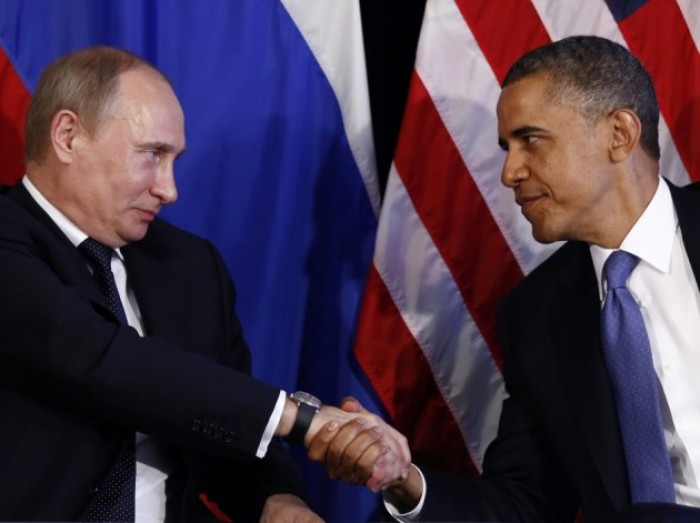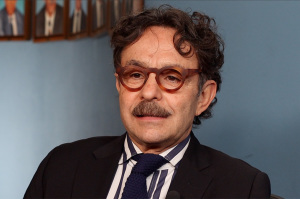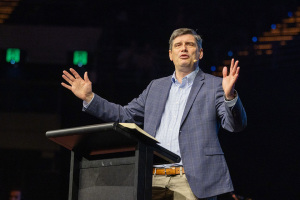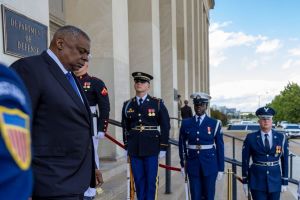Russia Consolidates Control Over Crimea; Retaliates Against US With Sanctions
Russian troops on Saturday seized a Ukrainian airbase in Crimea, a day after the completion of the region's annexation, while Russia's state media explained the basis for sanctions against "anti-Russian" U.S. congressmen and senators, including John McCain and John Boehner.

Ukrainian forces were forced to vacate a naval base and surrender two flagship vessels to Russian forces Saturday. Six Russian armored vehicles broke through the gates of Belbek Airbase even as troops fired warning shots into the air, CNN reported, quoting a spokesman for Ukraine's Ministry of Defense in Crimea. A journalist was injured in the attack.
In addition, pro-Russian self-defense forces stormed and captured the Novofederoskoe military base in Crimea.
The attacks come a day after Putin signed documents to complete the process of annexing Crimea, defying Western leaders who have called the move "illegal" and saying they will continue to consider the region as part of Ukraine.
Meanwhile, the state-owned Voice of Russia reported Saturday that the Russian Foreign Ministry has declared a "black list" of nine American politicians to retaliate against President Obama's announcement of sanctions against Russian officials.
The broadcaster said the list includes House Speaker Boehner and Republican Senator McCain, who recently visited Kiev's Maidan, which was the venue for three months of protests against former pro-Russia President Viktor Yanukovych. More than 82 people had died in the demonstrations.
Boehner has been "fiercely critical" of Russia in general and of Russian President Vladimir Putin in particular, the media said, adding that Russian political analysts are in agreement that the American politician has violated "the etiquette rules for international relations."
McCain is "in no way inferior to Boehner in his anti-Russian zeal," the Russian media added, accusing him of promoting "anti-Russian statements" and issuing "direct threats" to "boost his popularity."
"Senator McCain is part of the extreme right wing of the US neoconservatives; he is a Vietnam War veteran," said Andrei Sidorov, Deputy Dean of the Moscow State University Faculty of International Politics. "Once a Soviet missile hit his aircraft over Hanoi; it must be since then that he has been hostile towards Russia. On the other hand, McCain doesn't often come up with major bills in Congress. But he must prop up his popularity somehow, so he decided to adopt an anti-Russian stance and thus attract a certain Republican electorate."
McCain responded to the sanctions by tweeting, "I'm proud to be sanctioned by Putin – I'll never cease my efforts & dedication to freedom & independence of Ukraine, which includes Crimea."
The sanctions also include Senate Majority Leader Harry Reid and Sens. Mary Landrieu, Daniel Coats and Robert Menendez, as well as presidential advisers Caroline Atkinson, Daniel Pfeiffer and Benjamin Rhodes.
Putin stopped short of attempting to impose any economic sanctions on the U.S. However, the Russian Foreign Ministry spokesman Alexander Lukashevich was quoted as saying that America's "anti-Russian sanctions would not go unanswered and that Russia would respond in kind to each hostile move."
Russia's retaliatory action comes after Obama's announcement of sanctions against Putin's closest long-time political and business allies and possible future penalties against "key sectors of the Russian economy."
The annexation of Crimea follows Ukraine parliament's removal of Yanukovych on Feb. 22, after which he fled to Russia and ethnic Russian forces seized the region. The Crimean peninsula, an autonomous republic in the southeastern region of Ukraine, was part of Russia until 1954.
The protests in Ukraine began after Yanukovych administration's suspension of preparations for signing an Association Agreement and a Free Trade Agreement with the European Union, in favor of closer economic relations with Russia.





























